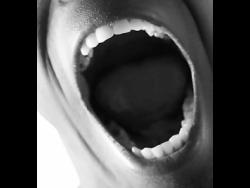Check-up: Why is his mouth so dry all the time? | Lifestyle
3 min read
Dear Readers,
Derek is a 54-year-old man who asks Check Up why his mouth always feels so dry recently.
He drinks plenty of water every day, but this doesn’t seem to help much. Both his lips and tongue feel dry and his spit also feels thick.
He hopes that Check Up can help out by indicating what could be the cause.
Dry mouth (xerostomia) is a condition in which the salivary glands in the mouth don’t make enough saliva to keep the mouth properly moist.
This is a problem because saliva helps to prevent tooth decay, limits the growth of germs in the mouth, and helps with swallowing and removing food particles from the mouth. Enzymes present in saliva help to start the process of digesting of food.
Dry mouth most often occurs as a side effect of medications. It can also occur as a result of cancer radiation treatment or as a direct disorder of the salivary glands.
When saliva production is low several symptoms occur, including:
Dryness and stickiness in the mouth.
Thick saliva.
Dry or sore throat and hoarseness.
Dry, grooved tongue.
Bad breath.
Change in sense of taste.
Increased need to drink liquids.
Problems with wearing dentures.
Lipstick sticking to the teeth.
Hundreds of medications bought by prescription, as well as over-the-counter medications, are associated with dry mouth.
These include antihistamines and decongestants used to treat allergies and sinus congestion, many anti-anxiety and anti-depressant medications, muscle relaxants, and painkillers, as well as some medications used in the treatment of high blood pressure.
Cancer treatment can dry out your mouth. Chemotherapy does it temporarily while using the drugs. The changes can be either temporary or permanent with radiation therapy to the head and neck as the salivary glands can be damaged.
Whether they can regain some function after the treatment is completed depends how much damage occurs.
Many older people experience dry mouth. This can be due to chronic health problems, the medications used to treat these problems, or poor nutrition.
Other possible causes:
Health conditions such as diabetes, stroke, Alzheimer’s disease, autoimmune diseases, or even HIV.
Recreational drugs, including marijuana.
Nerve injury to the head and neck area.
Regular alcohol and tobacco use.
Dry mouth will cause:
Mouth sores.
Tooth decay with increased plaque formation.
Gum disease.
Cracked lips and split skin at the mouth corners.
Oral yeast infection (thrush).
Difficulty chewing and swallowing.
Poor nutrition.
Dry mouth can affect your appetite and enjoyment of food! So what can you do?
Derek, check on the side effects of all medications which you might be using, both over the counter and prescribed. Check with your doctor to substitute the medications if any are identified.
Avoid caffeine, alcohol and tobacco, which remove mouth moisture.
Suck on ice chips throughout the day.
Wash out the mouth with a non-alcohol-based mouthwash.
Apply Glycerin as an oral lubricant to the mouth, tongue, gums and lips at intervals.
Moisturise the lips with Vaseline or lip balm.
Chew sugar-free gum to stimulate saliva flow.
Ear, nose and throat surgeons may be able to prescribe medications which can increase the flow of saliva.
Of course, how well dry mouth can be resolved will depend on its cause. Some causes are easily resolved, while other causes will require time.
Visit your general practitioner who will decide what needs to be done and if you need a referral to any specialist
Write Check Up: PO Box 1731, Kgn. Email: arnaj56@gmail.com
Source: https://marijuana.einnews.com/article/489524882/RoGh190Oiw__AV0T?ref=rss&ecode=GO9x8Zg-Kjb7oPTj







